
Wassily Kandinsky Painting Reproductions 7 of 7
1866-1944
Russian Expressionist Painter
Wassily Kandinsky was a renowned Russian painter and art theorist who is widely regarded as one of the pioneers of abstract art. He was born on December 16, 1866, in Moscow, Russia, and passed away on December 13, 1944, in Neuilly-sur-Seine, France. Kandinsky's artistic career spanned several countries, and he played a crucial role in the development of abstract expressionism.
Wassily Kandinsky was born into a well-to-do family in Moscow. His father was a tea merchant, and his mother came from a family of Mongol descent. Despite showing an early interest in art, Kandinsky initially pursued a more conventional path. He attended the University of Moscow, where he studied law and economics. During this time, he became involved with the university's ethnographic museum, where he researched and published articles on folk art.
In 1896, at the age of 30, Kandinsky decided to pursue a career in art. He moved to Munich, Germany, and enrolled at the Academy of Fine Arts. He studied under Anton Ažbe and later Franz von Stuck. During this period, Kandinsky's artistic style primarily revolved around traditional landscapes and figurative works.
Kandinsky's artistic journey took a significant turn in 1901 when he saw an exhibition of paintings by Claude Monet. The encounter with Monet's work had a profound impact on Kandinsky, inspiring him to explore the potential of color and form beyond representational art.
In 1910, Kandinsky co-founded the influential artistic group known as "Der Blaue Reiter" (The Blue Rider) with fellow artist Franz Marc. This group sought to express spiritual and emotional ideas through abstract art. Kandinsky's work during this period began to exhibit the characteristics of abstraction, with an emphasis on color, shape, and non-representational forms.
In his seminal 1910 treatise, "Concerning the Spiritual in Art," Kandinsky articulated his theories on the spiritual significance of abstract art and the potential for color and form to evoke emotions. This work solidified his reputation as a leading figure in the development of abstract art and established him as a prominent art theorist.
After the outbreak of World War I, Kandinsky returned to Russia in 1914. He became involved with the Russian Revolution and was appointed as a commissar for visual arts. He taught at the Moscow Academy of Fine Arts and played a significant role in establishing the Institute of Artistic Culture in Moscow.
However, political turmoil and the rise of the Soviet regime led Kandinsky to leave Russia in 1921. He settled in Germany, where he joined the faculty of the Bauhaus school in Weimar. At the Bauhaus, Kandinsky continued to explore abstract art and taught various art courses. The school was eventually closed by the Nazis in 1933, and Kandinsky was forced to leave Germany.
Kandinsky spent his final years in France, where he produced some of his most iconic works. He continued to experiment with color, form, and abstraction, creating vibrant and energetic compositions. Wassily Kandinsky passed away on December 13, 1944, in Neuilly-sur-Seine, France.
Kandinsky's contributions to abstract art were profound. He is considered one of the key figures in the development of non-representational art and a pioneer of the abstract expressionist movement. His innovative use of color, form, and composition helped redefine the possibilities of artistic expression, inspiring generations of artists to explore the boundaries of traditional representation.
Wassily Kandinsky was born into a well-to-do family in Moscow. His father was a tea merchant, and his mother came from a family of Mongol descent. Despite showing an early interest in art, Kandinsky initially pursued a more conventional path. He attended the University of Moscow, where he studied law and economics. During this time, he became involved with the university's ethnographic museum, where he researched and published articles on folk art.
In 1896, at the age of 30, Kandinsky decided to pursue a career in art. He moved to Munich, Germany, and enrolled at the Academy of Fine Arts. He studied under Anton Ažbe and later Franz von Stuck. During this period, Kandinsky's artistic style primarily revolved around traditional landscapes and figurative works.
Kandinsky's artistic journey took a significant turn in 1901 when he saw an exhibition of paintings by Claude Monet. The encounter with Monet's work had a profound impact on Kandinsky, inspiring him to explore the potential of color and form beyond representational art.
In 1910, Kandinsky co-founded the influential artistic group known as "Der Blaue Reiter" (The Blue Rider) with fellow artist Franz Marc. This group sought to express spiritual and emotional ideas through abstract art. Kandinsky's work during this period began to exhibit the characteristics of abstraction, with an emphasis on color, shape, and non-representational forms.
In his seminal 1910 treatise, "Concerning the Spiritual in Art," Kandinsky articulated his theories on the spiritual significance of abstract art and the potential for color and form to evoke emotions. This work solidified his reputation as a leading figure in the development of abstract art and established him as a prominent art theorist.
After the outbreak of World War I, Kandinsky returned to Russia in 1914. He became involved with the Russian Revolution and was appointed as a commissar for visual arts. He taught at the Moscow Academy of Fine Arts and played a significant role in establishing the Institute of Artistic Culture in Moscow.
However, political turmoil and the rise of the Soviet regime led Kandinsky to leave Russia in 1921. He settled in Germany, where he joined the faculty of the Bauhaus school in Weimar. At the Bauhaus, Kandinsky continued to explore abstract art and taught various art courses. The school was eventually closed by the Nazis in 1933, and Kandinsky was forced to leave Germany.
Kandinsky spent his final years in France, where he produced some of his most iconic works. He continued to experiment with color, form, and abstraction, creating vibrant and energetic compositions. Wassily Kandinsky passed away on December 13, 1944, in Neuilly-sur-Seine, France.
Kandinsky's contributions to abstract art were profound. He is considered one of the key figures in the development of non-representational art and a pioneer of the abstract expressionist movement. His innovative use of color, form, and composition helped redefine the possibilities of artistic expression, inspiring generations of artists to explore the boundaries of traditional representation.
160 Kandinsky Paintings
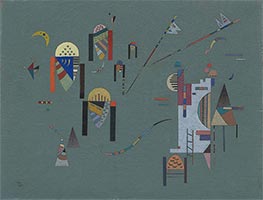
Vertical Accents 1942
Oil Painting
$771
$771
Canvas Print
$54.63
$54.63
SKU: KAW-18403
Wassily Kandinsky
Original Size: 32 x 42 cm
Solomon R. Guggenheim Museum, New York, USA
Wassily Kandinsky
Original Size: 32 x 42 cm
Solomon R. Guggenheim Museum, New York, USA
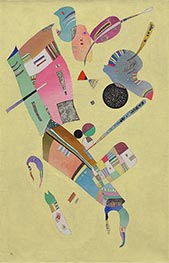
Moderation 1940
Oil Painting
$964
$964
Canvas Print
$54.63
$54.63
SKU: KAW-18404
Wassily Kandinsky
Original Size: 99.7 x 64.6 cm
Solomon R. Guggenheim Museum, New York, USA
Wassily Kandinsky
Original Size: 99.7 x 64.6 cm
Solomon R. Guggenheim Museum, New York, USA
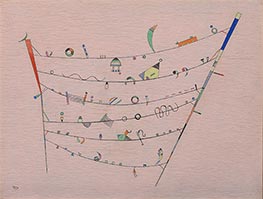
Little Accents 1940
Oil Painting
$684
$684
Canvas Print
$54.63
$54.63
SKU: KAW-18405
Wassily Kandinsky
Original Size: 32 x 42 cm
Solomon R. Guggenheim Museum, New York, USA
Wassily Kandinsky
Original Size: 32 x 42 cm
Solomon R. Guggenheim Museum, New York, USA
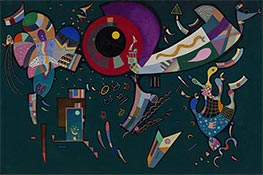
Around the Circle 1940
Oil Painting
$1228
$1228
Canvas Print
$54.95
$54.95
SKU: KAW-18406
Wassily Kandinsky
Original Size: 97.2 x 146.4 cm
Solomon R. Guggenheim Museum, New York, USA
Wassily Kandinsky
Original Size: 97.2 x 146.4 cm
Solomon R. Guggenheim Museum, New York, USA
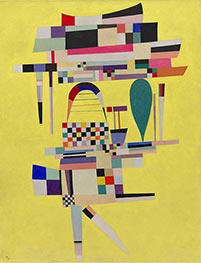
Yellow Painting 1938
Oil Painting
$963
$963
Canvas Print
$63.38
$63.38
SKU: KAW-18407
Wassily Kandinsky
Original Size: 116.4 x 89 cm
Solomon R. Guggenheim Museum, New York, USA
Wassily Kandinsky
Original Size: 116.4 x 89 cm
Solomon R. Guggenheim Museum, New York, USA
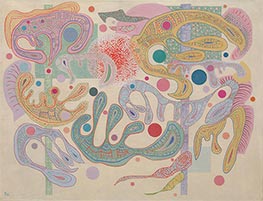
Capricious Forms 1937
Oil Painting
$1278
$1278
Canvas Print
$63.08
$63.08
SKU: KAW-18408
Wassily Kandinsky
Original Size: 89 x 114.8 cm
Solomon R. Guggenheim Museum, New York, USA
Wassily Kandinsky
Original Size: 89 x 114.8 cm
Solomon R. Guggenheim Museum, New York, USA
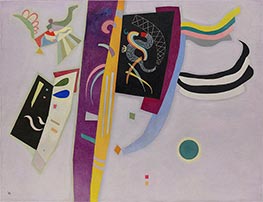
Violet-Orange 1935
Oil Painting
$873
$873
Canvas Print
$63.38
$63.38
SKU: KAW-18409
Wassily Kandinsky
Original Size: 89.4 x 116.5 cm
Solomon R. Guggenheim Museum, New York, USA
Wassily Kandinsky
Original Size: 89.4 x 116.5 cm
Solomon R. Guggenheim Museum, New York, USA
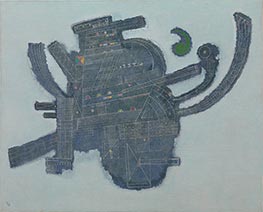
Green Accent 1935
Oil Painting
$1109
$1109
Canvas Print
$66.69
$66.69
SKU: KAW-18410
Wassily Kandinsky
Original Size: 81.3 x 100 cm
Solomon R. Guggenheim Museum, New York, USA
Wassily Kandinsky
Original Size: 81.3 x 100 cm
Solomon R. Guggenheim Museum, New York, USA
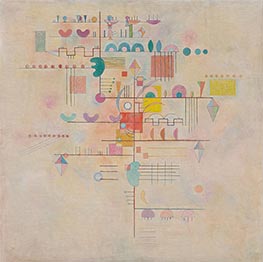
Graceful Ascent 1934
Oil Painting
$981
$981
Canvas Print
$82.50
$82.50
SKU: KAW-18411
Wassily Kandinsky
Original Size: 80.3 x 80.6 cm
Solomon R. Guggenheim Museum, New York, USA
Wassily Kandinsky
Original Size: 80.3 x 80.6 cm
Solomon R. Guggenheim Museum, New York, USA
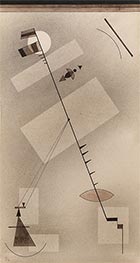
Taut Line 1931
Paper Art Print
$52.14
$52.14
SKU: KAW-18412
Wassily Kandinsky
Original Size: 48 x 26 cm
Solomon R. Guggenheim Museum, New York, USA
Wassily Kandinsky
Original Size: 48 x 26 cm
Solomon R. Guggenheim Museum, New York, USA
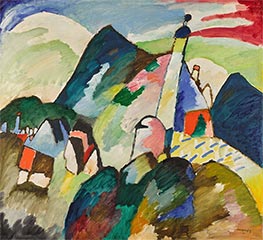
Murnau with Church II 1910
Oil Painting
$725
$725
Canvas Print
$75.58
$75.58
SKU: KAW-18979
Wassily Kandinsky
Original Size: 96 x 105.5 cm
Private Collection
Wassily Kandinsky
Original Size: 96 x 105.5 cm
Private Collection
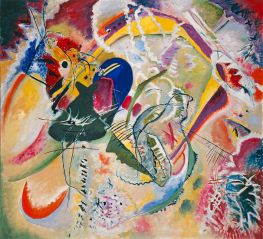
Improvisation 35 1914
Oil Painting
$1253
$1253
Canvas Print
$75.28
$75.28
SKU: KAW-19341
Wassily Kandinsky
Original Size: 110.3 x 120.3 cm
Kunstmuseum, Basel, Switzerland
Wassily Kandinsky
Original Size: 110.3 x 120.3 cm
Kunstmuseum, Basel, Switzerland
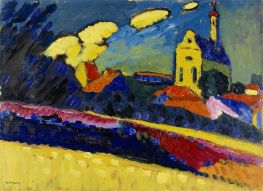
Study for Murnau - Landscape with Church 1909
Oil Painting
$387
$387
Canvas Print
$54.63
$54.63
SKU: KAW-19342
Wassily Kandinsky
Original Size: 33 x 45 cm
Kunstmuseum, Basel, Switzerland
Wassily Kandinsky
Original Size: 33 x 45 cm
Kunstmuseum, Basel, Switzerland
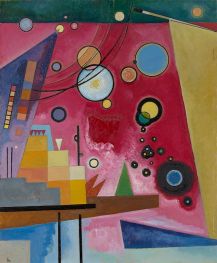
Heavy Red 1924
Oil Painting
$939
$939
Canvas Print
$68.35
$68.35
SKU: KAW-19343
Wassily Kandinsky
Original Size: 58.7 x 48.7 cm
Kunstmuseum, Basel, Switzerland
Wassily Kandinsky
Original Size: 58.7 x 48.7 cm
Kunstmuseum, Basel, Switzerland
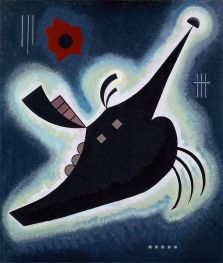
Pointed Black 1931
Oil Painting
$696
$696
Canvas Print
$70.31
$70.31
SKU: KAW-19344
Wassily Kandinsky
Original Size: 70 x 59.5 cm
Kunstmuseum, Basel, Switzerland
Wassily Kandinsky
Original Size: 70 x 59.5 cm
Kunstmuseum, Basel, Switzerland
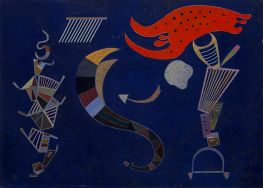
The Arrow 1943
Oil Painting
$701
$701
Canvas Print
$59.16
$59.16
SKU: KAW-19345
Wassily Kandinsky
Original Size: 42 x 58 cm
Kunstmuseum, Basel, Switzerland
Wassily Kandinsky
Original Size: 42 x 58 cm
Kunstmuseum, Basel, Switzerland